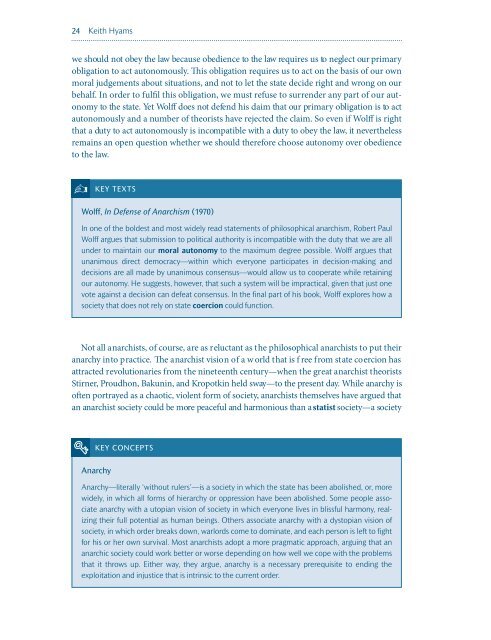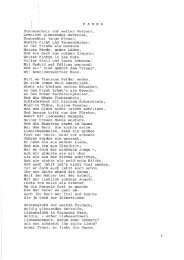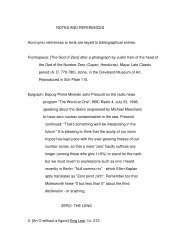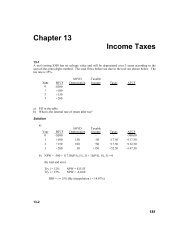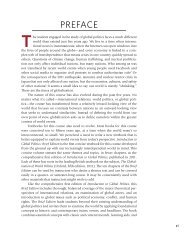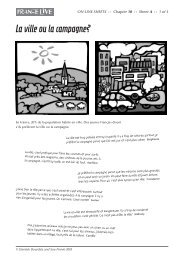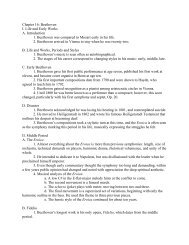1 Political authority and obligation Political authority and obligation
1 Political authority and obligation Political authority and obligation
1 Political authority and obligation Political authority and obligation
Create successful ePaper yourself
Turn your PDF publications into a flip-book with our unique Google optimized e-Paper software.
24 Keith Hyams<br />
we should not obey the law because obedience to the law requires us to neglect our primary<br />
<strong>obligation</strong> to act autonomously. Th is <strong>obligation</strong> requires us to act on the basis of our own<br />
moral judgements about situations, <strong>and</strong> not to let the state decide right <strong>and</strong> wrong on our<br />
behalf. In order to fulfi l this <strong>obligation</strong>, we must refuse to surrender any part of our autonomy<br />
to the state. Yet Wolff does not defend his claim that our primary <strong>obligation</strong> is to act<br />
autonomously <strong>and</strong> a number of theorists have rejected the claim. So even if Wolff is right<br />
that a duty to act autonomously is incompatible with a duty to obey the law, it nevertheless<br />
remains an open question whether we should therefore choose autonomy over obedience<br />
to the law.<br />
KEY TEXTS<br />
Wolff, In Defense of Anarchism (1970)<br />
In one of the boldest <strong>and</strong> most widely read statements of philosophical anarchism, Robert Paul<br />
Wolff argues that submission to political <strong>authority</strong> is incompatible with the duty that we are all<br />
under to maintain our moral autonomy to the maximum degree possible. Wolff argues that<br />
unanimous direct democracy—within which everyone participates in decision-making <strong>and</strong><br />
decisions are all made by unanimous consensus—would allow us to cooperate while retaining<br />
our autonomy. He suggests, however, that such a system will be impractical, given that just one<br />
vote against a decision can defeat consensus. In the final part of his book, Wolff explores how a<br />
society that does not rely on state coercion could function.<br />
Not all anarchists, of course, are as reluctant as the philosophical anarchists to put their<br />
anarchy into practice. Th e anarchist vision of a w orld that is f ree from state coercion has<br />
attracted revolutionaries from the nineteenth century—when the great anarchist theorists<br />
Stirner, Proudhon, Bakunin, <strong>and</strong> Kropotkin held sway—to the present day. While anarchy is<br />
oft en portrayed as a chaotic, violent form of society, anarchists themselves have argued that<br />
an anarchist society could be more peaceful <strong>and</strong> harmonious than a statist society—a society<br />
KEY CONCEPTS<br />
Anarchy<br />
Anarchy—literally ‘without rulers’—is a society in which the state has been abolished, or, more<br />
widely, in which all forms of hierarchy or oppression have been abolished. Some people associate<br />
anarchy with a utopian vision of society in which everyone lives in blissful harmony, realizing<br />
their full potential as human beings. Others associate anarchy with a dystopian vision of<br />
society, in which order breaks down, warlords come to dominate, <strong>and</strong> each person is left to fight<br />
for his or her own survival. Most anarchists adopt a more pragmatic approach, arguing that an<br />
anarchic society could work better or worse depending on how well we cope with the problems<br />
that it throws up. Either way, they argue, anarchy is a necessary prerequisite to ending the<br />
exploitation <strong>and</strong> injustice that is intrinsic to the current order.


